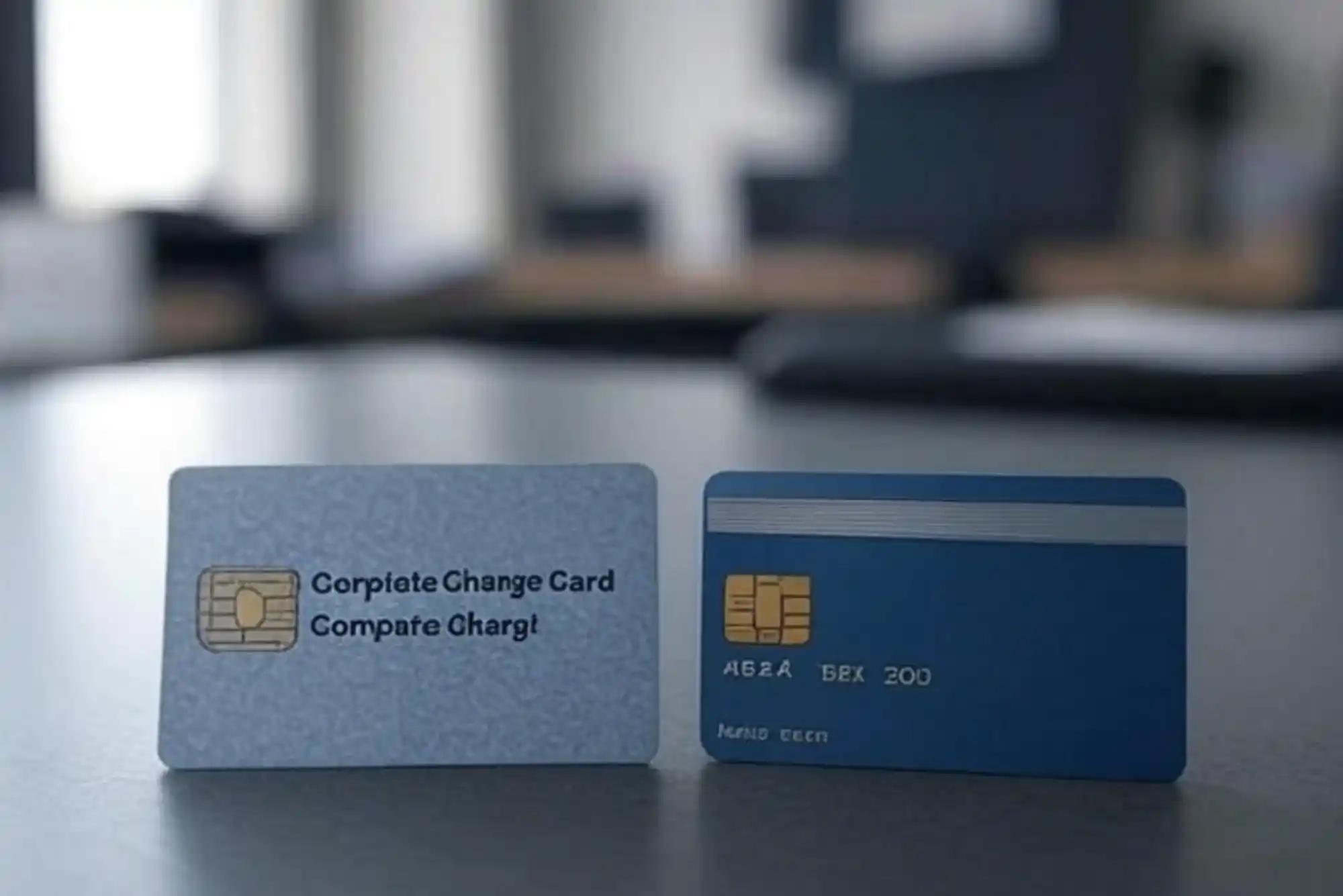When managing business expenses, choosing the right payment tool is essential for financial control and growth. Corporate charge cards and credit cards are two popular choices among the many options available. But which one is the best fit for your business?
In this article, we’ll compare corporate charge cards and credit cards, explore their differences, and help you understand which option best suits your business’s needs.
Understanding Corporate Charge Cards
A corporate charge card is a payment method issued by financial institutions or card providers specifically for businesses. Unlike traditional credit cards, corporate charge cards don’t offer a revolving line of credit. Instead, they require businesses to pay off the entire balance each month, typically in full.
These cards are typically used for business expenses such as travel, office supplies, client dinners, and other operational costs. Corporate charge cards are designed to streamline expense management and provide businesses with better control over spending.
Understanding Credit Cards
On the other hand, credit cards are a widely used payment option that gives individuals or businesses access to a line of credit, which can be borrowed against and repaid over time. The key difference here is that credit cards allow users to carry a balance from month to month, with the option of making minimum payments or paying off the full amount.
Credit cards come in many types, including personal, business, and corporate, each tailored to different needs. For businesses, credit cards are often used for similar purposes as corporate charge cards, covering expenses like office supplies, travel, and other operational costs. But, with the added flexibility of revolving credit.
Key Differences Between Corporate Charge Cards and Credit Cards
Now that we have a basic understanding of both corporate charge cards and credit cards, let’s dive into some of the key differences between the two. These differences can play a significant role in determining which option is better for your business.
1. Payment Structure: Full Payment vs Revolving Credit
One of the primary differences between a corporate charge card and a credit card is the payment structure. With a corporate charge card, you are typically required to pay the full balance every month. This means there’s no option to carry a balance, and the entire amount must be cleared before the due date.
In contrast, credit cards offer more flexibility. You can carry a balance from month to month and make partial payments, though this usually comes with interest charges. While this can be advantageous in terms of cash flow management, it also means that you may end up paying more in interest over time if you don’t pay off the full balance each month.
2. Spending Limits
Corporate charge cards and credit cards also differ when it comes to spending limits. Corporate charge cards usually don’t have a preset spending limit, meaning your business can charge as much as it needs, as long as the balance is paid off in full by the due date.
However, the lack of a preset limit doesn’t mean that spending is unlimited; credit card providers may monitor spending patterns and may impose restrictions or approve larger expenditures based on your business’s financial health.
On the other hand, credit cards come with a defined credit limit. This limit is set by the credit card issuer based on factors like your company’s creditworthiness and financial situation. While this can provide a clearer picture of how much your business can spend, it also means that exceeding the limit could result in over-the-limit fees or denied transactions.
3. Interest Rates and Fees
Interest rates and fees are a crucial aspect to consider when choosing between a corporate charge card and a credit card. Corporate charge cards generally don’t carry interest charges, since they require full payment by the due date. This is beneficial for businesses that can commit to paying off their balances in full each month.
Credit cards, however, typically come with interest charges on any balances that are carried beyond the due date. If your business tends to carry a balance or has variable cash flow, the interest charges can quickly add up. Additionally, credit cards may have annual fees, foreign transaction fees, and late payment fees, all of which can increase costs over time.
4. Rewards and Perks
Both corporate charge cards and credit cards often come with rewards programmes, but the types of rewards and benefits may differ. Many corporate charge cards offer rewards for business-related purchases such as travel, office supplies, and dining. These rewards can include points, cashback, or discounts on future purchases.
Credit cards also offer rewards, but the rewards programmes on business credit cards may not be as tailored to business expenses. While credit cards may provide cashback or travel miles, the rewards structure may not be as focused on the specific needs of a business. Moreover, credit cards often have limits on the amount of rewards you can earn.
Pros and Cons of Corporate Charge Cards
Pros:
- No interest charges: Since the balance must be paid off in full each month, there are no interest charges, which helps businesses avoid expensive interest rates.
- Clear expense management: With no revolving credit, businesses can have a more predictable approach to managing their expenses and cash flow.
- Higher credit limits: The lack of a preset limit can offer businesses greater flexibility in spending, especially for large expenses.
- Simplified accounting: Paying off the balance each month helps simplify accounting and tax reporting.
Cons:
- No revolving credit: Businesses that need flexibility with payment may find the requirement to pay the full balance each month limiting.
- Potential for high late fees: Missing a payment due date can result in significant late fees, so it’s essential to stay on top of deadlines.
- Less flexibility for cash flow issues: If your business faces temporary cash flow issues, the rigid payment structure could be difficult to manage.
Pros and Cons of Credit Cards
Pros:
- Revolving credit: Credit cards offer flexibility, allowing businesses to carry a balance and make smaller payments over time. This can be especially useful during periods of financial strain or uncertainty.
- Rewards programmes: Business credit cards often come with rewards such as cashback, travel points, and discounts, which can be valuable for frequent business travellers.
- Widely accepted: Credit cards are accepted virtually everywhere, making them a convenient option for businesses that need to make purchases across various industries.
- Variety of options: There are many different types of business credit cards to choose from, allowing you to select the one that best fits your business needs.
Cons:
- Interest charges: Carrying a balance from month to month can result in high-interest charges, especially if the balance isn’t paid off in full.
- Spending limits: Unlike corporate charge cards, credit cards have a set spending limit that can be restrictive for businesses with higher needs.
- Risk of overspending: With the flexibility of revolving credit, businesses may find themselves overspending, especially if they don’t keep track of their monthly balances.
Which Option is Best for Your Business?
The decision between a corporate charge card and a credit card depends on your business’s financial habits, needs, and goals. Here’s a quick guide to help you decide:
- If your business can pay off expenses in full each month and you want to avoid interest charges, a corporate charge card may be the best choice. The lack of interest and clear payment structure can provide better financial control.
- If your business needs flexibility with cash flow or if you prefer to make partial payments over time, a credit card might be a more suitable option. Credit cards can provide a safety net during months when your cash flow is tight, but remember to pay off the balance to avoid hefty interest charges.
In the end, both options offer distinct advantages and drawbacks, so it’s important to evaluate your business’s specific financial situation before making a decision. Consider your spending habits, cash flow patterns, and the types of expenses your business incurs regularly to choose the best payment tool for your needs.
Conclusion
Whether you opt for a corporate charge card or a credit card, both offer valuable tools for managing business expenses. The key is to align the choice with your company’s financial strategy and cash flow. With the right card, you can improve your expense management, streamline accounting, and even earn rewards that benefit your business in the long run.









